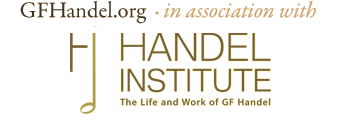This web site is an evolving project dedicated to the great baroque composer George Frideric Handel (auf deutsch: "Georg Friedrich Händel"; elsewhere also written Haendel or Hendel, and in Italy nicknamed 'il caro Sassone'). Handel was the consummate eighteenth-century traveller, performer, composer and
entrepreneur. He was independent and strong-willed, and although
he was invited several times by potential patrons to become their employee,
he seems to have been hesitant to settle down until he became established in London - where he eventually acquired the status he felt he deserved.
Born on 23 February 1685 in Halle, Germany, Handel grew up under the watchful eyes of his
parents; while his mother nurtured his musical gifts, his father tried to
dissuade him from pursuing the dubious occupation of a musician. Following brief
law studies at the local university, Handel travelled to Hamburg, where he scraped a living as a back-desk violinst at the opera house and composed his first opera Almira. By late 1706 he decided to travel independently to Italy, where he composed church, secular and theatre music for illustrious patrons in Florence, Rome, Naples and Venice; he also met numerous Italian composers who significantly
influenced his work, such as Arcangelo
Corelli, Alessandro Scarlatti, his son Domenico Scarlatti, Giacomo Perti, Bernardo Pasquini, Francesco Gasparini, Antonio Caldara and many others.
Following his fruitful Italian grand tour, Handel returned north of the Alps in early 1710 and accepted
an appointment as kapellmeister to the Elector of Hanover. However, by the end of the year he had arrived in London, where his opera Rinaldo was premiered in 1711. During the 1710s he settled
permanently in Britain, writing operas for the Queen's Theatre (renamed the King's Theatre in 1714 after the accession of the Elector of Hanover to the British throne), although for a short while he also composed music for the Earl of Carnarvon's country estate Cannons (including the delightful dramatic masque Acis and Galatea). In 1719 Handel became the music director of the newly-founded Royal Academy of Music, a company organsied to establish Italian opera on the London stage; important operas written for this company include Radamisto, Giulio Cesare in Egitto, Tamerlano and Rodelinda.
In 1723 Handel moved into a house on Brook Street in Mayfair that would become his home for the rest of his life. Four years later he became a naturalized British citizen, and in October 1727 he provided four anthems for the coronation of George II (including Zadok the Priest, which has been performed at every British coronation since). In 1732 he revived Esther (the first English oratorio), and for the rest of the decade he mixed Italian operas and English-language concert works together in his theatre seasons; during this period many of his finest masterpieces were composed and first performed, including Orlando, Ariodante, Alcina, Alexander's Feast, Saul, the Op. 6 concerti grossi and the Miltonic ode L'Allegro, il Penseroso ed il Moderato. His last Italian operas Imeneo and Deidamia were performed during the 1740-1 season.
Handel continued to live a dramatic and productive life during the 1740s, writing diverse works such as Biblical dramatic oratorios (Samson, Belshazzar, Solomon), secular music dramas based on Greek classical tragedies (Semele and Hercules) and patriotic concert works (Judas Maccbaeus). However, life wasn't easy for him. At
various times, he was severely criticized by the some voices of the English social establishment
for his artistic endeavours - some had considered Italian operas ridiculous, but now others believed that presented Biblical concert dramas or musical settings of scripture was profane. For example, his
famous oratorio Messiah was enthusiastically received at its
première (Dublin, 1742) whereas it became the subject of great controversy following
its London début a year later. Furthermore, from summer 1737 he suffered occasional bouts of serious physical illnesses (most likely strokes - although some have speculated that he suffered central nervous system
lead poisoning associated with his imbibing of cheap port!). During the later
years of his life, he experienced progressively debilitating cataracts, and the
ensuing operations to restore his vision left him completely blind (the last English oculist to treat Handel, John Taylor, also
unsuccessfully cared for J.S. Bach).
"Total eclipse! no sun, no moon.
All dark amidst the blaze of noon.
Oh glorious light! no cheering ray
To glad my eyes with welcome day."
(Samson)
However, despite this adversity, Handel maintained a keen sense of humour and was
well-known for his charitable disposition, and developed a particularly close association with the Foundling Hospital, which hosted annual benefit performances of Messiah. Most importantly, Handel created some of the most beguiling music ever written - not least his final two mature masterpieces Theodora and Jephtha. He died on 14 April 1759 and was buried in Poet's Corner, Westminster Abbey. Published only a year later, the anecdotal biography by John Mainwaring was the first printed book of any kind devoted to the life and work of a single composer. Although most widely known for Messiah, the Water Music and a few much-loved popular tunes, in the last few decades audiences and listeners all over the world have become fascinated anew by the theatrical diversity, insightfulness and charm of the range of the many prolific works of the great Mr. Handel.

